What does it cost to have a dog in the family?
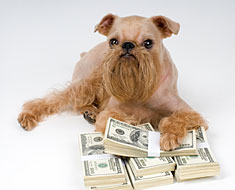
If you're considering adding a dog to your family, chances are you've already considered the fact that you will have to buy dog food and visit the vet occasionally, but have you considered the totality of expenses you may be faced with? Before you bring a dog into your home, you'll need to decide if you have not only the time required to care for the animal, but also if you have the financial resources to provide for all of his needs.
First year cost of dog ownership
Many of the expenses associated with a pet occur in the first year. Not only do you have to purchase the animal, you will also have to pay for all of the durable goods that go with the animal such as bowls, leashes, and a crate. In addition, you may have to pay for puppy shots and for spaying or neutering the dog so you don't contribute to our nation's massive pet over-population problem. What can you expect all of this to cost?
The main determinant of the cost of purchase is whether you decide you want a purebred dog from a breeder or a dog from a shelter or rescue organization. Shelters generally offer the lowest purchase price, but you may or may not be able to get a purebred animal. In most cases, the shelter will ask you to pay for spay / neuter surgery, plus a small amount to cover their expenses. It's not unusual to be able to buy a shelter dog for considerably less than $100.
The next most affordable dogs often come from rescue organizations. They, too, will ask for you to cover the spay/neuter expenses, but rescue organizations often have a harder time attracting grants and donations, so you will be asked to contribute more toward their overhead than you would typically pay at a shelter. Rescue dogs generally cost between $100 and $300.
What's the difference between a shelter and a rescue?
Shelters are generally larger and may be affiliated with a national organization such as the Humane Society of the United States or the ASPCA. Rescue organizations are typically very small, sometimes run by just one individual. Most rescues are staffed solely by volunteers and the dogs are usually kept in foster homes rather than at a central location. Dogs often end up at a rescue as a result of having been "pulled" from a shelter prior to being euthanized.
Many rescue organizations specialize in a particular breed, so you may have a better shot at getting the breed of your choice. On the flip side, many of the dogs in rescue are there because they are harder to adopt. For example, they may be elderly or have significant personality issues due to prior abuse. There is usually a reason why they were pulled from the shelter by the rescue organization to prevent the shelter from euthanizing them.
The most expensive place to obtain a dog is from a breeder. Depending on the breed, you can expect to pay anywhere from $500 to $2,000 and up for a purebred dog. For this price, you will get the right to pay an additional fee to register your dog with the AKC, which will be important if you plan to show or breed your dog. If you are adopting for companionship only, there is no real reason for registering your dog or for even having a purebred.
More first-year expenses of dog ownership
Beyond the purchase price, you can expect to pay approximately $300 - $500 in vet bills for a puppy, somewhat less for an older dog. For a puppy, you will need to pay for spay/neuter surgery (unless the shelter or rescue organization has already taken care of this), vaccinations, and regular check-ups. For an older dog, you may or may not need the surgery and shots, but you will definitely need the regular check-ups. Pet health insurance is available, but often costs more than you would expect to pay directly to the vet in an average year.
Depending on how much fur your dog has, you might have expenses related to grooming. If you care for the dog's coat at home, you will have to buy some shampoo made specifically for dogs, plus a good comb or brush, for a total cost of less than $25. If you cannot handle the task at home, you can expect to pay $40 - $70 for grooming approximately every two months.
At the pet store, you can expect to spend somewhere between $10 and $75 for a leash and collar, depending on the size of the dog and the degree to which you see these necessities as a fashion statement.
For food and water, you can use leftover plastic bowls from the last time you bought whipped topping, or you can purchase bowls at the pet store, again at a wide variance of cost depending on whether you are looking for something utilitarian or something that matches your kitchen.
You will need to buy kibble, moist food, or ingredients to make homemade dog food. Don't plan on feeding your dog table scraps, as many human foods are harmful to dogs. Obviously, small dogs cost less to feed than large dogs. There are huge differences in the quality of commercially-made dog food. You can choose a grocery-store brand that costs roughly $20 for a 40-pound bag, or you can go for a premium brand that can cost upwards of $20 for a 7-pound bag. See our articles on dog nutrition to help you decide which is best for your dog and your budget.
If you have lots of disposable income, you can invest a small fortune in a bed and toys for your dog. If not, you can spread an old towel or blanket on the floor and make your own toys out of an old milk bottle, the cut-off portion of a pair of jeans shorts, or a leftover bone from the stew pot.
You may have expenses related to the damage a puppy can do such as replacing shoes and other items the puppy chews.
Last, but not least, you may decide to invest in a crate to keep the dog contained when you are away from home. For a smallish dog, you can simply use a cardboard box, but you may have issues with leakage until you get the dog housebroken. A crate should be large enough to allow an adult dog to stand up with head held high and to turn around. Although your puppy will look absolutely ridiculous in a crate made for an adult dog, you can avoid the expense of buying another crate later by buying the correct size for the full-sized dog your puppy will grow to be, and some large crates come with dividers so you can portion off a smaller part of the crate while your dog is still puppy-sized. New crates cost between $35 and $100, but you can often find used crates in good condition at garage sales, online auctions or online classified listings.
Dog Costs beyond the First Year
After the first year, your expenses slow down immensely, assuming your dog remains healthy. You will have ongoing food expenses, which will grow with your dog, but your toy expenses will go down drastically after the first year. As toys wear out, you may need to buy replacements, but your dog's need for chew toys may lessen as he or she gets beyond puppyhood. If your dog stays home alone often, you will want to continue to provide toys that combat boredom just to protect your stuff from being chewed.
In an average year, you will likely pay for only one or two vet visits plus any booster shots your dog may need. An average year at the vet's for a dog in good health might cost between $200 and $300. As your dog ages, however, vet costs will increase as you deal with the problems associated with advancing age. Cancer, arthritis, and other ailments can run into the thousands of dollars for diagnostics and treatment.
You can always drop money into your pet expenses by buying fancy accessories like sweaters, designer beds, and collar jewelry, but you don't have to. The American Pet Products Manufacturers' Association reports that families in the United States spent over $48 billion on their pets during 2010.
Doggies Den: Latest Articles
 Homemade Thanksgiving Treats for Your Dog
Homemade Thanksgiving Treats for Your Dog
NUTRITION We all want to include our dogs in our holiday celebrations, but hopefully, you're aware that sharing table scraps with your dog isn't always the best idea.
 Keeping Your Dog Safe during the Summer Months
Keeping Your Dog Safe during the Summer Months
HEALTH Summer is coming on fast, so it’s time to plan how you will keep your dog safe and healthy through the lazy, carefree, warm days.
 Vaccination Time Again-Keeping Your Puppy Healthy
Vaccination Time Again-Keeping Your Puppy Healthy
DOG HEALTH So you have your new puppy picked out. There are quite a few shots, treatments and examinations that will keep the newest member of your family healthy.
 Canine Thanksgiving Feast
Canine Thanksgiving Feast
NUTRITION With the wide variety of food at Thanksgiving dinner, chances are you'll want to give your dog something special, too. If you're contemplating what to feed your dog for the holiday, here is a guide to a great Canine Thanksgiving Feast.
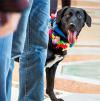 Dog Walking Tips Every Owner Should Know
Dog Walking Tips Every Owner Should Know
DOG FUN Walking your dog is not only crucial to keeping him healthy and happy, it strengthens the bond between your canine friend and his caregiver. There are a lot of obstacles out there. Don’t forget these simple tips to keep your walk fun and safe in the outside world.
 The Benefits of Physiotherapy for your Dog
The Benefits of Physiotherapy for your Dog
HEALTH The same techniques that physiotherapists use to treat a variety of injuries and conditions in humans have been adapted to suit animals with great success. Family pets, show dogs, and working dogs can all benefit greatly from physiotherapy. Dogs whose activities involve a lot of agility are especially susceptible to the types of problems that physiotherapy can address.
 The Decision- Adding a Dog to Your Family
The Decision- Adding a Dog to Your Family
FIRST TIME OWNERSBringing a dog into your family is a decision where many people don’t realize it’s magnitude until after they have the dog. There are a number of things that you need to research before you decide to purchase a dog, and it starts right in your own home.
 Bringing Your Dog Into Your New Baby's Life
Bringing Your Dog Into Your New Baby's Life
HEALTH Many believe that a dog and a new baby cannot happily coexist, so therefore the dog has to go. This is not necessarily the case.  A new baby does not mean you have to abandon your dog.

Doggies Den:
Most Popular Articles
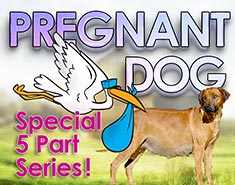
Dog Pregnancy Symptoms
HEALTHIf you suspect your dog might be pregnant, check out part one in this series on pregnant dogs, where we cover pregnant dog symptoms.
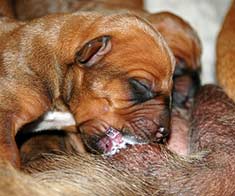
Dog Birth
HEALTHIn the third article of our dog pregnancy series, we look at the wonderful, but messy, process of bringing newborn puppies into the world.
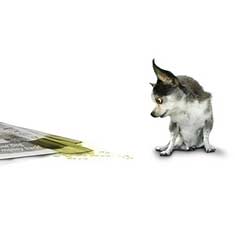
Indoor Dog Potties
DOG PRODUCTSIt's been a long day at work. You were so busy, you didn't even take time to eat a sandwich, let alone run home to let your dog out. You're on your way home, knowing the poor dog is crossing his or her legs by now, when your car breaks down, delaying you even further. Can't somebody make this easier?
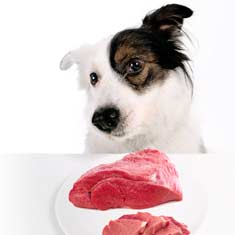
Your Dog’s Digestive System
PHYSIOLOGYEver wonder why your dog eats so fast? Or why he eats gross things? Or why he gets sick to his stomach? Or why his waste stinks so bad? Some of these things are normal, some are not.

Canine Respiratory System
BREATHINGThe basic function of your dog's respiratory system is to bring oxygen in to and remove carbon dioxide from the body. Knowing the symptoms of respiratory diseases can help you help your stay healthy.
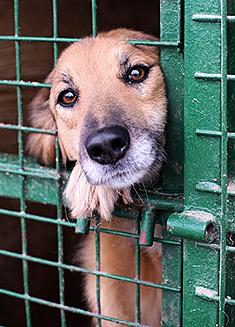
Shelter Dog Adoption Tips for Success
ADOPTION Are you intimidated by the prospect of "rescuing" a dog from a shelter? One reason that you may be wary of adopting a dog from a shelter is not knowing how to choose. Adopting a dog from a shelter can be a rewarding process, if you're prepared to do a reasonable amount of research.
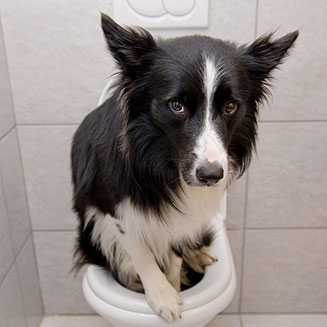
Canine Urinary Tract Infections
SYMPTOMS AND TREATMENTDoes your dog seem to be having trouble relieving his or her bladder? Learn how to recognize the signs of urinary tract infections and how to treat them before they spread.
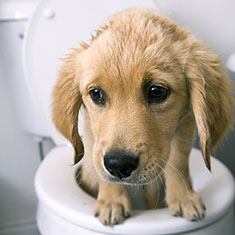
What to do for Dog Diarrhea
SYMPTOMS AND REMEDIESIf you have dogs in your house for any length of time, you have likely experienced at least one bout of dog diarrhea. Beyond the pain in the tuckus involved in cleaning up the mess, you should know what causes diarrhea, and when it's important to see the vet.

What to do for a Dog Bite
DOG BEHAVIOR Getting bitten by a dog can be scary, and you may be tempted to run around in circles for a while, trying to figure out what to do. Here's our guide to help you manage the situation.
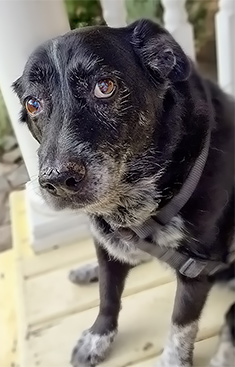
Top Ten Tips for Living with a Senior Dog
DOG HEALTH Bringing home a new puppy is so exciting, but it doesn’t take all that long for your exuberant puppy to grow into a senior dog who may have special needs. Here are the doggies.com top ten tips for taking care of your companion who has been with you through so much.
